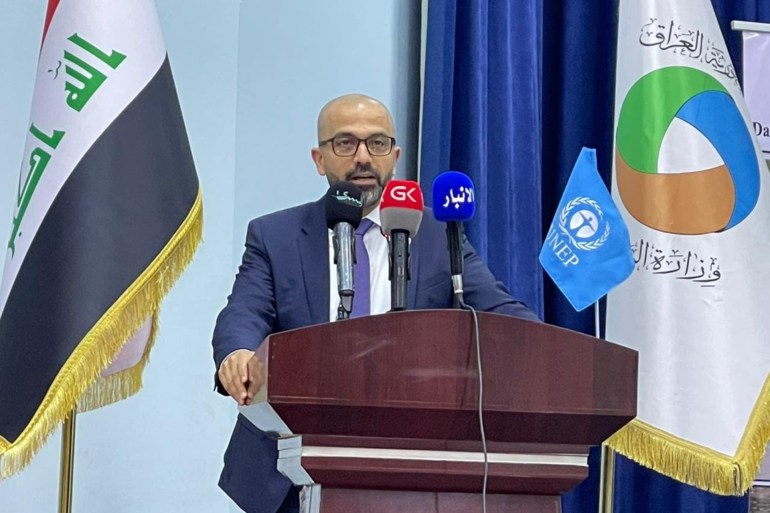The United Nations has warned that the level of the Tigris and Euphrates rivers in Iraq is dropping by up to 73%, and called for Iraq's participation in meaningful discussions with neighboring countries on water sharing.
The Regional Director of the United Nations Environment Program, Sami Dimas, said in a press conference held yesterday in Baghdad, that "Iraq is witnessing manifestations of lack of rain and its impact on the levels of the Tigris and Euphrates rivers at rates that reached 73%, and the rise in temperatures to rates 7 times faster than the global rise, as well as Population imbalance by 70% in urban areas, which led to the decline of agriculture.
Dimas called for collective action to confront environmental and biological threats (Iraqi News Agency)
Dimas pointed out that "environmental degradation, loss of biodiversity, exacerbation of desertification, land degradation and the recurrence of extreme weather events pose serious threats to humans in the region unless collective action is taken, and we will all be risking the livelihoods of millions of people."
He added, "Natural reserves are a major strategy to preserve nature and stop the loss of biodiversity, so we have, over the past years, in active partnership with the Iraqi Ministry of Environment and with funding from the Global Environment Facility, implemented a project to establish a network of reserves in Iraq, to contribute to Iraq's fulfillment of its obligations towards the Convention on Biological Diversity." And setting the basic framework for natural reserves that will cover an estimated 7% of the country’s area.
Aerial photos show the charm and beauty of Marsh Al-Dalamj, which is one of the most beautiful Iraqi marshes pic.twitter.com/NKpXf4CSI6
— Raad Al solaiti 🇮🇶 (@raadhusein12) May 25, 2020
He pointed out that "the selection of the areas of al-Tayyib and al-Dalamj in southern Iraq to be the first nature reserves, because of the great diversity of plants and animals that these areas have," noting that "more than 230 plant species have been recorded in Wadi al-Tayyib, in addition to hosting a large number of endangered species." birds, animals and reptiles, and the dependence of the inhabitants of about 14 villages on the services provided by this system as a means of subsistence.”
Blackshart called for Iraq's participation in meaningful discussions with neighboring countries regarding water sharing (communication sites)
water sharing
On Tuesday, the United Nations Special Representative in Iraq, Jenin Hennis-Plasschaert, called for Iraq's participation in meaningful discussions with neighboring countries on water sharing, stressing that the United Nations family in Iraq is working in partnership with Iraq to manage water resources and reduce its negative effects on the environment.
"Everywhere on our planet, water is the secret of life. In Iraq, the availability and proper management of water resources are of particular importance. Last month I visited the Mesopotamian marshes in the south, and witnessed the many challenges that Iraq faces," Blackshart said in a statement.
"Reduced rainfall, water shortages, soil and water salinization, ineffective resource management, and population growth are all factors that have impacted across the country. In addition to climate change, the active reduction of water flows from neighboring countries is another serious threat," she added.

